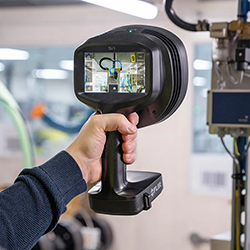3D printed PocketQube deployers in Carbon fiber filled composite material successfully launched from SpaceX’s Falcon 9 rocket
Target reached for "Alba Cluster 3 & 4", the recent new Alba Orbital's space mission, that had a record breaking with 13 PocketQube satellites launched from SpaceX's Falcon 9 rocket. The nanosatellites had been integrated in 5 Alba's deployers, entirely 3D printed by CRP Technology in Windform XT 2.0 Carbon fiber filled composite material. The mission occurred on Thursday 13 January at 3.25pm (GMT) from Cape Canaveral, as part of SpaceX's small satellite rideshare service and comprised a total of 105 small satellites
Five AlbaPod v2, the PocketQube deployers by Alba Orbital manufactured by CRP Technology using professional 3D printing and Carbon fiber reinforced composite material Windform XT 2.0, were launched into orbit as part of SpaceX's Transporter-3 mission using Falcon 9 rocket, occurred on Thursday 13th January 2022.
With 13 PocketQube spacecrafts integrated into five 3D printed AlbaPods v.2 deployers, the mission represented Alba Orbital's biggest cluster to date, and the first PocketQubes deployment from Falcon-9 Transporter-3. It has been the third dedicated launch for SpaceX's small satellite rideshare service, which aims to give microsatellites and CubeSats a more affordable ride into orbit.
Engineer Franco Cevolini, CEO and CTO at CRP Technology, states, "Congrats to Alba Orbital and to all the teams flown with them, for all their hard work. On Thursday 13th January 2022 it has been signed a new milestone in the nanosatellites arena: we are very proud of being part as supplier of materials and technology that are integration and space-proven! The successful mission demonstrates once again the extreme value of Windform for highly performance, heavy duty and mission-critical applications."
Four out of the 13 PocketQubes that participated in the mission, marked a "first" :
- "UNICORN-2A, 2D & 2E" are Alba Orbital's first Earth Observation satellites designed to provide the highest resolution dataset of the earth at night;
- 1p "PION-BR1" is the very first satellite to be developed by a Brazilian start-up;
- 1p "GRIZU-263a" is Turkey's first ever pico-satellite to be launched in-orbit, it was designed and built by Turkish student team Grizu-263 Uzay Takımı.
- "TARTAN-ARTIBEUS -1" is the first intermittent, orbital edge computing nanosatellite that operates with no batteries aboard the SpaceX Falcon-9 Transporter-3 mission. This open source project was developed at Carnegie Mellon University
crptechnology.com
windform.com
Featured Product

